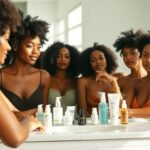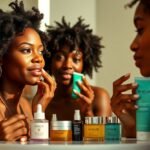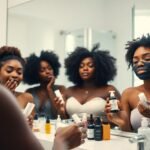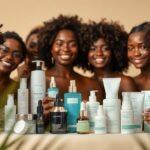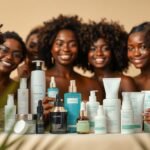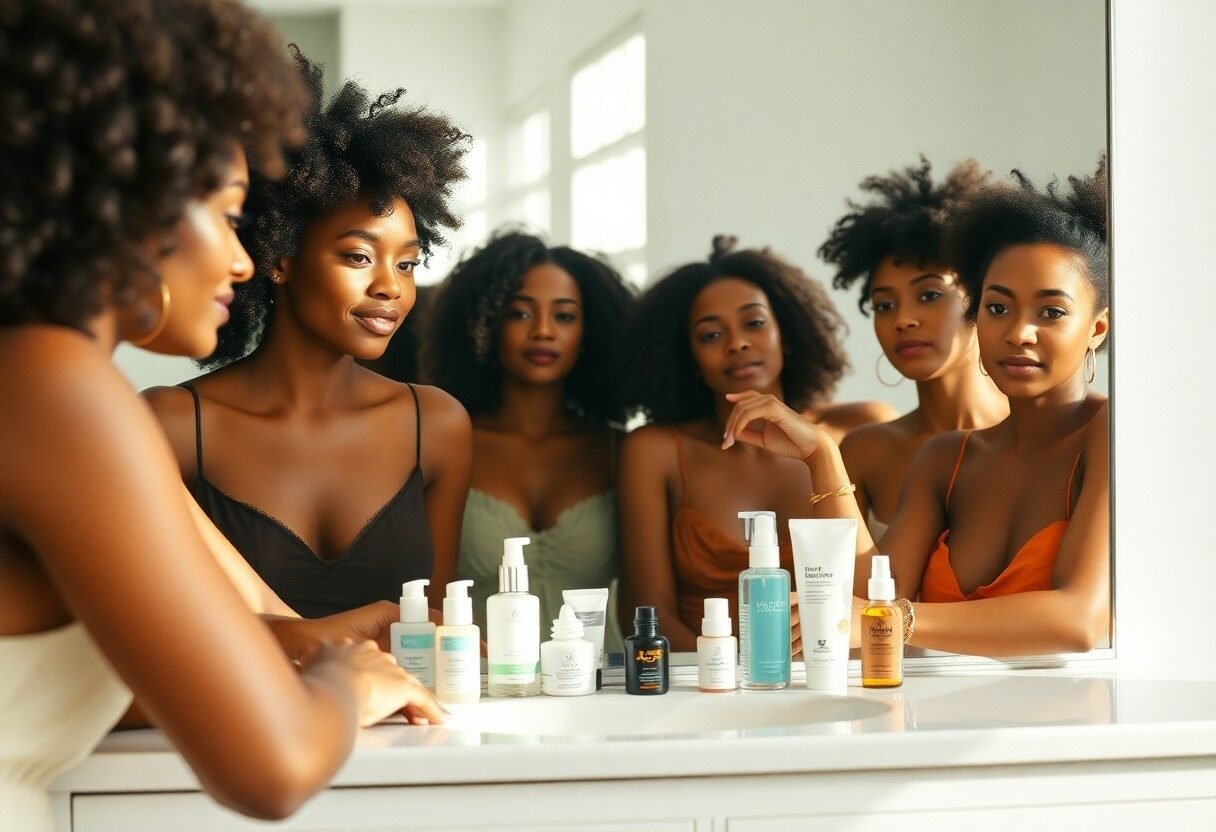
There’s a wealth of information to explore when it comes to skincare, especially for African American women. I understand how important it is for you to nurture your unique skin type, which can be susceptible to issues like hyperpigmentation and dryness. In this post, you will discover vital products and tips tailored specifically for your skin’s needs, ensuring you achieve a radiant, healthy complexion. Let’s research into the key elements that will help you enhance your skincare routine.
Key Takeaways:
- Hydration is imperative; use a rich moisturizer to combat dryness often experienced by African American skin.
- Incorporate sunscreen into your daily routine, as even darker skin tones can be at risk for UV damage.
- Gentle exfoliation is important to promote cell turnover; consider using chemical exfoliants over physical scrubs to avoid irritation.
- Choose products that cater to hyperpigmentation, as many African American women may experience dark spots or uneven skin tone.
- Look for ingredients like shea butter, jojoba oil, and vitamin E in your skincare products to nourish and protect the skin.
- Regular skin cleansing is beneficial; opt for non-stripping cleansers that maintain the skin’s natural moisture barrier.
- Be mindful of specific skin concerns, such as acne or sensitivity, and tailor your skincare regimen accordingly.
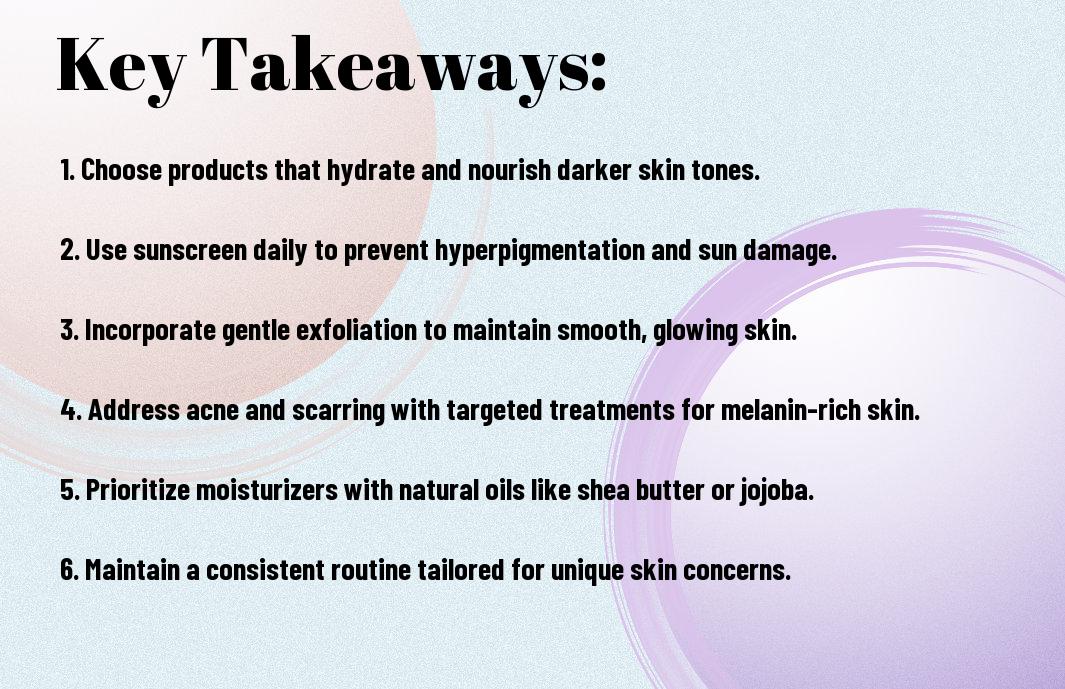
Decoding Melanin-Rich Skin: Myths and Truths
The relationship between melanin-rich skin and its unique qualities often leads to confusion. Various myths persist, suggesting that darker skin types are impervious to dangers like sun damage or skin conditions. Understanding these myths fosters informed choices, allowing you to embrace your skin’s natural beauty while acknowledging its specific needs.
Common Misconceptions About Black Skin
Many common misconceptions about Black skin suggest that it doesn’t require the same level of care and protection as lighter skin. Some believe that because melanin offers greater UV protection, Black skin is immune to sunburn or skin cancer. However, this is misleading – while melanin provides some defense, it does not eliminate the risk entirely.
The Role of Melanin in Skin Health
Melanin serves a protective role in your skin health, acting as a natural barrier against UV radiation. It absorbs and disperses harmful rays, reducing the chances of damage that can lead to skin cancer. However, despite this protective quality, melanin-rich skin still experiences issues, such as hyperpigmentation, irritation, and scarring, which require diligent skincare to manage effectively.
Additionally, melanin produces different concentrations in various individuals, influencing how skin responds to environmental factors and internal changes. For instance, those with higher melanin levels may experience fewer signs of aging, but they also might face challenges like uneven skin tone and post-inflammatory hyperpigmentation. Recognizing these facts empowers you to develop a tailored skincare regimen that addresses not just beauty but also the overall health of your skin.
The Essential Ingredients for Vibrant Skin
For radiant skin, the right ingredients make all the difference. I’ve found that incorporating specific elements into my skincare regimen can address the unique needs of African American skin. Look for products rich in hydrating agents, antioxidants, and sunscreens. Each of these plays a pivotal role in enhancing skin texture, tone, and overall health. By combining these vital ingredients, you can develop a powerful routine that promotes a vibrant, youthful glow.
Key Hydrating Agents for African American Skin
Hydrating agents like glycerin, hyaluronic acid, and shea butter are key to maintaining moisture levels. These ingredients not only lock hydration into the skin but also help create a protective barrier against environmental stresses. I’ve noticed that using a moisturizer containing hyaluronic acid leaves my skin looking plump and radiant, while shea butter provides vital fatty acids that nourish and soften my skin, combating the dryness that often occurs.
The Importance of Antioxidants and Sunscreens
Integrating antioxidants and sunscreens into my daily routine is non-negotiable for healthy skin. Ingredients like vitamin C and green tea extract protect against oxidation that can lead to premature aging. Meanwhile, a broad-spectrum sunscreen with at least SPF 30 defends against both UVA and UVB rays, preventing hyperpigmentation, a common concern for many African American women. I always apply sunscreen, even on cloudy days, as UV rays can penetrate through clouds and still cause harm.
Regular use of antioxidants can brighten and even out skin tone, counteracting the effects of stress and environmental pollutants. I love incorporating a vitamin C serum into my morning routine—it not only helps combat dark spots but also boosts collagen production. Pairing this with a consistent sunscreen application significantly mitigates the risks of sun damage and skin discoloration. Investing in these vitals ensures that your skin remains not only vibrant but also resilient against external aggressors.
Tailored Skincare Routines for Various Skin Types
Crafting a skincare routine that caters specifically to your skin type can significantly enhance your overall complexion. For optimal results, it’s vital to identify whether your skin is oily, dry, or combination. Here’s a quick breakdown:
| Skin Type | Recommended Products |
|---|---|
| Oily | Oil-free cleansers, matte moisturizers, clay masks |
| Dry | Hydrating serums, rich creams, nourishing oils |
| Combination | Lightweight lotions, targeted treatments, gentle exfoliants |
| Sensitive | Fragrance-free products, soothing balms, minimal ingredients |
| Acne-prone | Non-comedogenic products, salicylic acid treatments, lightweight moisturizers |
Recognizing your skin type provides a solid foundation for tailored product selection and routine development to achieve radiant skin.
Oily vs. Dry: Specific Challenges and Solutions
Oily skin often struggles with excess shine and larger pores, making it prone to breakouts, while dry skin may feel tight, flaky, and show signs of premature aging. Finding the right balance involves using oil-free moisturizers for oily skin to prevent additional shine, alongside gentle exfoliants to clear clogged pores. For dry skin, incorporating a rich, cream-based moisturizer with ingredients like hyaluronic acid or natural oils can restore hydration and create a plump, youthful appearance.
Navigating Combination Skin with Targeted Products
Combination skin typically exhibits characteristics of both oily and dry skin, resulting in varied needs across different areas of your face. Targeting products helps cater to these unique challenges, ensuring that oily zones are balanced without exacerbating dryness in others. Focus on lightweight gels or lotions for oily areas like the T-zone and richer creams for dryer patches on the cheeks or around the eyes, promoting an even, healthy complexion.
Navigating combination skin requires a bit of strategy but can lead to impressive results. I often recommend using a gentle exfoliant to clear oil buildup while incorporating a nourishing serum specifically for dryness. Products labeled as non-comedogenic can help prevent breakouts in oily areas. A tailored approach, like spot-treating with clay masks on oily zones and hydrating overnight masks for dryness, can make all the difference, allowing for radiance without compromise.
Addressing Specific Skin Concerns
Understanding your unique skin concerns is necessary for achieving your best skin. Many African American women experience specific issues such as hyperpigmentation, acne, and scarring, which require targeted approaches. By focusing on specialized treatments and incorporating suitable products into your routine, you can address these concerns more effectively. Let’s explore some of the most common skin issues and how to tackle them head-on.
Hyperpigmentation: Causes and Treatment Options
Hyperpigmentation often occurs due to sun exposure, inflammation, or hormonal changes. I’ve discovered that incorporating ingredients like vitamin C and exfoliating acids can significantly brighten dark spots and even skin tone. Daily sunscreen is a non-negotiable to prevent further discoloration, while treatments such as chemical peels or laser therapy may offer additional options for more resistant cases.
Acne and Scarring: Strategies for Clearer Skin
Acne can be frustrating, particularly when it leaves behind dark scars. Focusing on a consistent cleansing routine with salicylic acid or benzoyl peroxide as part of your regimen can help prevent breakouts. Incorporate healing ingredients like niacinamide and hyaluronic acid to support your skin’s recovery and reduce inflammation. Using products with retinoids can accelerate skin cell turnover, fading scars over time.
Coping with acne and scarring requires a holistic approach. After identifying your triggers, I recommend maintaining a consistent skincare routine tailored to oily or combination skin. For persistent acne, consider trying a topical prescription treatment or engaging in professional chemical peels to combat severe scarring. It’s also beneficial to avoid picking at blemishes, as this can exacerbate scarring. Regularly moisturizing helps keep your skin barrier intact, ultimately leading to a clear, more even complexion.
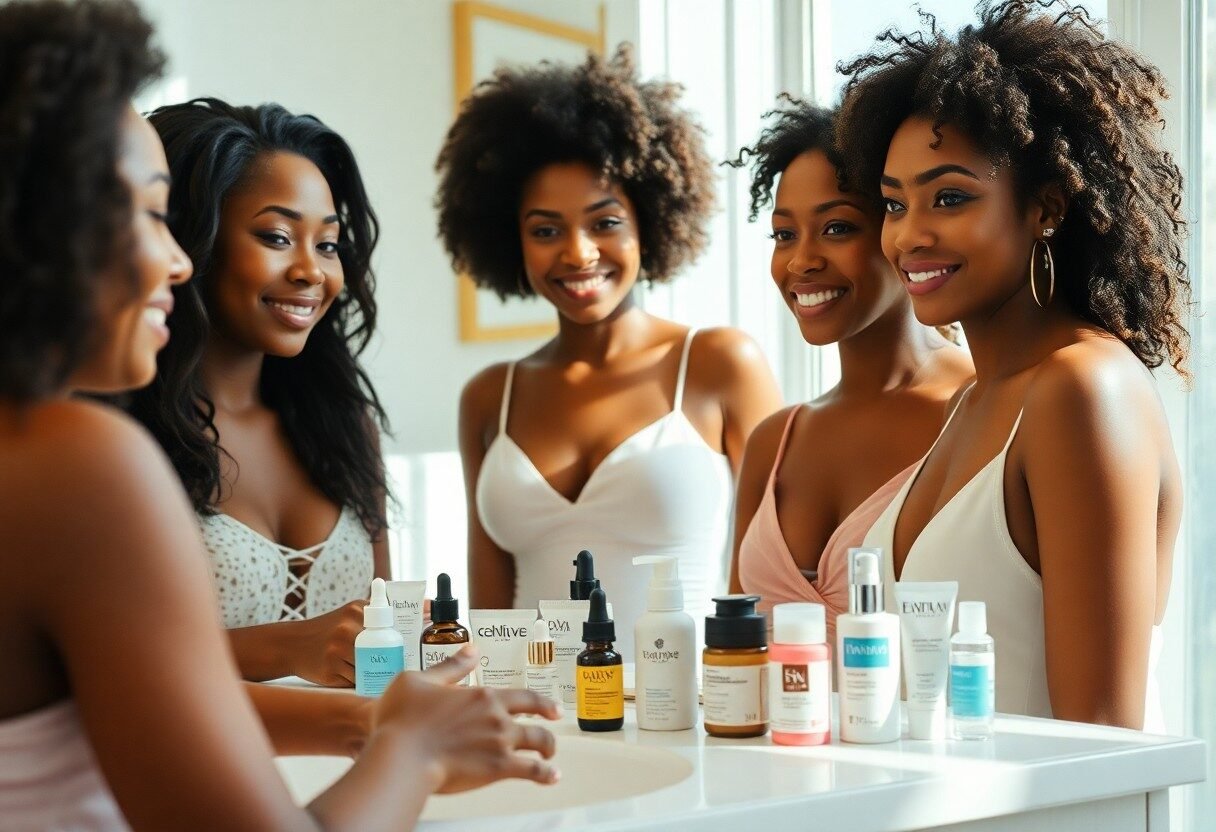
The Cultural Connection: Skincare Through an African American Lens
Understanding skincare within the African American community goes beyond mere products; it’s a reflection of our rich cultural heritage. Generational beauty practices reveal how traditions, family rituals, and community values shape our approach to skincare, emphasizing the significance of self-care as both a personal and collective experience. Acknowledging this cultural narrative honors the diverse backgrounds and lived experiences of African American women, while facilitating the conversation about skincare needs and preferences that resonate most with us.
Historical Practices Influencing Modern Routines
Generations of African American women have relied on time-honored beauty secrets ranging from natural remedies like shea butter and coconut oil to more sophisticated formulations influenced by cultural significance. These historical practices have paved the way for modern routines, emphasizing hydration and the gentle care of textured skin. The resilience in utilizing what was available in our environment shaped our understanding of skincare’s vital role in health, beauty, and self-identity.
The Role of Community in Skincare Choices
Skincare choices do not happen in isolation; they are often inspired by the experiences and practices shared among friends and family. Conversations about product effectiveness and beauty techniques flourish within tight-knit communities, creating a shared knowledge base that fosters trust in specific brands and ingredients. This communal sharing helps eliminate guessing games and supports the collective upliftment of our members, ensuring that everyone has access to the importants that cater to our unique skin needs.
Engaging in dialogue within your community about skincare can yield incredible insights, guiding you toward beloved products and rituals that have stood the test of time. For instance, many find strength in participating in “skincare talk” sessions where individuals exchange their favorite creams, share tips on combating hyperpigmentation, or discuss the latest trends in beauty. In this way, community becomes a wellspring of resources that not only promotes knowledge but also fosters connections, creating a more personalized skincare journey for everyone involved. By uplifting each other and sharing experiences, you can discover what truly works for your unique skin type and concerns, leading to healthier, glowing skin.
To wrap up
The journey to maintaining healthy skin as an African American woman involves understanding your unique skin type and its specific needs. I encourage you to prioritize hydration, use quality moisturizers, and incorporate products with ingredients like hyaluronic acid and shea butter that cater to your skin’s characteristics. Pay attention to sun protection, as it is important no matter your skin tone. By establishing a consistent skincare routine tailored to your needs, you’re equipped to enhance your natural beauty and radiance.
FAQ
Q: What are the most important skincare products for African American women?
A: The important skincare products for African American women typically include a gentle cleanser, a hydrating toner, a moisturizer with natural ingredients, sunscreen with at least SPF 30, and treatments for hyperpigmentation such as vitamin C serums or niacinamide. These products can help maintain skin health, hydration, and even skin tone.
Q: How can African American women treat hyperpigmentation?
A: Hyperpigmentation can be effectively treated using products that contain ingredients like glycolic acid, retinoids, vitamin C, and licorice root extract. Regular exfoliation and wearing sunscreen daily to prevent further darkening of spots are also beneficial. Consulting with a dermatologist for more severe cases can provide additional treatment options like chemical peels or laser therapy.
Q: Why is hydration particularly important for African American skin?
A: African American skin tends to be less oily and can often be drier due to a lower level of sebum production. Keeping the skin hydrated helps maintain its elasticity and radiance. Using a rich moisturizer containing ingredients such as shea butter or hyaluronic acid can provide adequate moisture and combat dryness.
Q: How can African American women address uneven skin tone?
A: To address uneven skin tone, incorporating exfoliation into your routine is important. This can be achieved using chemical exfoliants (like AHAs or BHAs) or physical exfoliants. Additionally, using brightening agents such as vitamin C serums can help improve skin clarity. Consistent use of sunscreen is also important to protect the skin from further discoloration.
Q: What should be considered when choosing a sunscreen for deeper skin tones?
A: When choosing sunscreen for deeper skin tones, it is important to select a broad-spectrum sunscreen that contains non-comedogenic ingredients and is formulated to absorb easily without leaving a white cast. Options like tinted sunscreens or those containing mineral ingredients like zinc oxide can provide better coverage and protection for darker skin tones.
Q: Can African American women use the same skincare products as women with lighter skin tones?
A: While many skincare products can be universally effective, it’s important to consider the unique characteristics of African American skin, such as its tendency towards hyperpigmentation and dryness. Products specifically formulated for melanin-rich skin often contain nourishing ingredients that address these specific concerns, making them better suited for African American women.
Q: How often should African American women exfoliate their skin?
A: Exfoliation frequency can vary depending on individual skin types. Generally, gentle exfoliation 1-2 times a week is effective for African American women to help remove dead skin cells and promote cell turnover without causing irritation. If using chemical exfoliants, it’s important to follow the recommendations on the product’s label and to listen to your skin’s response.
